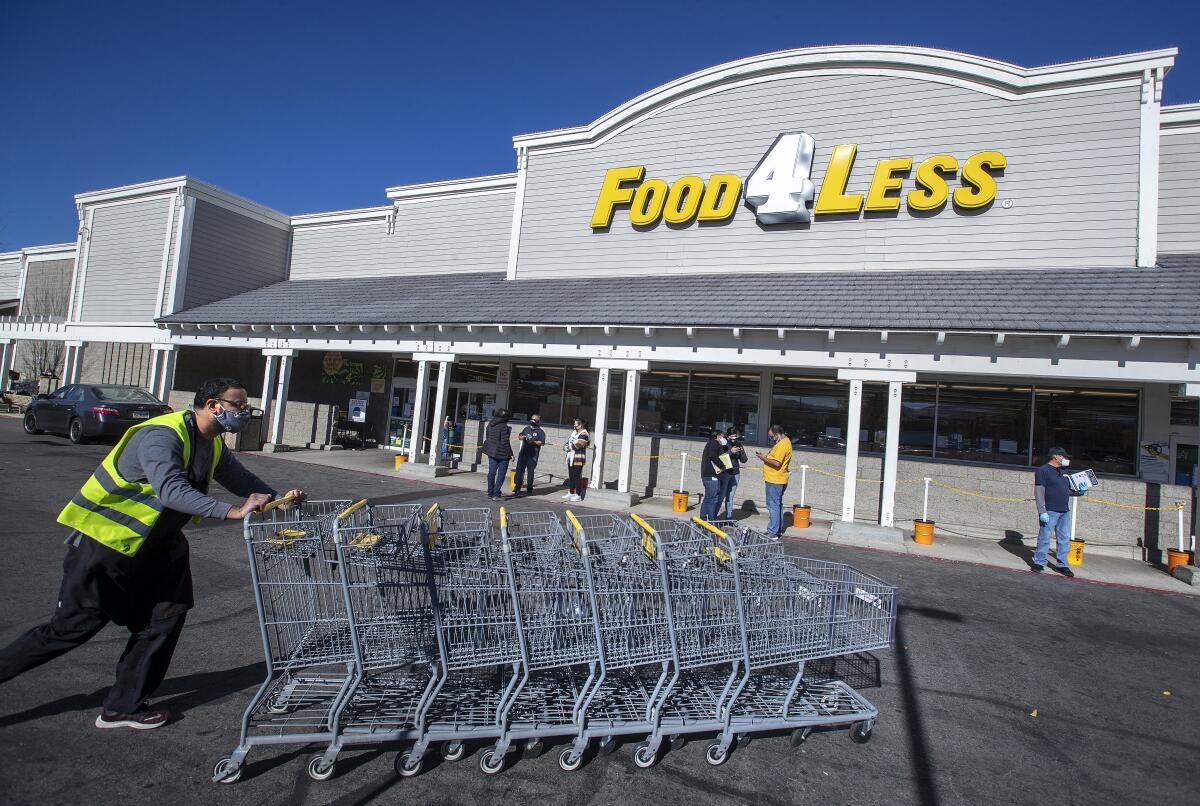Food 4 Less workers in California vote to authorize strike

Nearly 6,000 workers at Food 4 Less locations across California this week voted to authorize a strike if Kroger, the grocery chain’s owner, continues with what they say are labor violations during ongoing contract talks.
The vote comes after several locals of the union, United Food and Commercial Workers, filed multiple claims of unfair labor practices with the National Labor Relations Board in late May. The union has accused Food 4 Less managers of undermining negotiations, surveilling and discriminating against union members, and trying to prevent employees from participating in union activity.
After a five-day voting period ended Friday, union officials announced workers had “overwhelmingly” voted to approve a potential strike. They declined to disclose how many workers had voted in favor and against the authorization.
“Food 4 Less executives have decided to resort to unlawful tactics instead of following federal labor law and treating the bargaining process with the respect and seriousness that it deserves,” the union said in a statement after the vote. “Food 4 Less is trying to intimidate, bully, and strong-arm us into accepting a contract that is less than what we deserve and far less than what their parent company, Kroger, offers to other union grocery workers in the area.”
A spokesperson for Food 4 Less criticized the union’s decision to seek the strike authorization, saying, “It remains our goal to put more money in our associates’ pockets.”
“We’ve remained committed to negotiating in good faith. From the start, our focus has been on reaching an agreement that benefits our hardworking and dedicated associates,” said Salvador Ramirez, corporate affairs manager at Food 4 Less/Foods Co. “We are deeply disappointed that UFCW Southern California chose to leave the bargaining table before contract expiration, rather than working together to prioritize the needs of their members.”
The mandate gives the union’s bargaining committee more leverage at the negotiating table as Food 4 Less officials know the union could call for employees to walk off the job at any time.
Negotiations over a new contract began nearly three months ago and soon became tense, said Kathy Finn, president of UFCW Local 770, which represents grocery workers in Los Angeles, Ventura, Santa Barbara and San Luis Obispo counties and is among the seven union locals involved in the negotiations.
The union locals last negotiated a contract with Food 4 Less in 2021; that contract expired June 8.
The union has no plans to strike imminently and is preparing for negotiations to resume Monday, Finn said.
Food 4 Less workers are pushing for pay parity with their counterparts at Ralphs. Kroger owns about 300 Ralphs and Food 4 Less stores in the state.
Clerks at Food 4 Less who check groceries and stock shelves make about $4 less in hourly wages than those with the same jobs at Ralphs. That’s in part because the company classifies its Ralphs locations as supermarkets while treating Food 4 Less stores as warehouse stores.
But workers and union leaders, who say there is little meaningful difference between the two chains, also allege a racial element to the pay inequalities. Food 4 Less stores tend to be in lower-income Black and brown communities, while Ralphs generally are in whiter and wealthier areas, the union says. When asked about the allegation, Food 4 Less representatives declined to comment.
The company’s latest proposal offers an hourly rate increase of about a $1 each year over the course of the contract, amounting to a total boost of $3.25. The union is pushing for about double that increase.
In a statement about the company’s proposal, which was sent to workers Monday, Bryan Kaltenbach, president of Food 4 Less, said, “Hardworking and dedicated associates are the heartbeat of our company, and our goal is to continue to provide market-competitive wages and benefits that we know are so important to our associates and their families.”
On Friday afternoon outside a Food 4 Less in Westlake, workers gathered around a table set up to cast their votes.
Jeanne Coleman, a cashier at the Westlake store, voted to approve a strike. She said that besides pay parity with Ralphs, she’s concerned about understaffing. At night, there might be just two cashiers on duty to field the rush of customers who come in to shop after work. Customers waiting in line will begin making calls asking the store to open up another station, she said.
“It’s ridiculous, the issues we have to deal with, but they don’t want to pay us,” Coleman said.
When the union announced it would hold a strike authorization vote, the company began posting notices to hire temporary workers at rates higher than many workers are currently paid, said Tyrone Severe, a cashier at the Westlake store.
“They are trying to hire nonunion workers and pay them more, instead of just negotiating with us,” Severe said. “We think that sucks.”
Members of the union’s bargaining committee accused the company of bargaining in bad faith. For example, during bargaining sessions scheduled for three consecutive days last week, the company’s negotiators showed up late and would leave the negotiation table for hours at a time, workers said.
Visits by Kaltenbach to various stores in recent weeks struck workers as an intimidation tactic.
Christopher Watkins, 24, a meat cutter at a Food 4 Less store in Inglewood, said he’s previously seen the president visit his store about twice a year, but in recent weeks he’s seen him about four times.
Food 4 Less did not comment in response to specific questions about worker claims of intimidation and treatment at the bargaining table.
More to Read
Inside the business of entertainment
The Wide Shot brings you news, analysis and insights on everything from streaming wars to production — and what it all means for the future.
You may occasionally receive promotional content from the Los Angeles Times.











